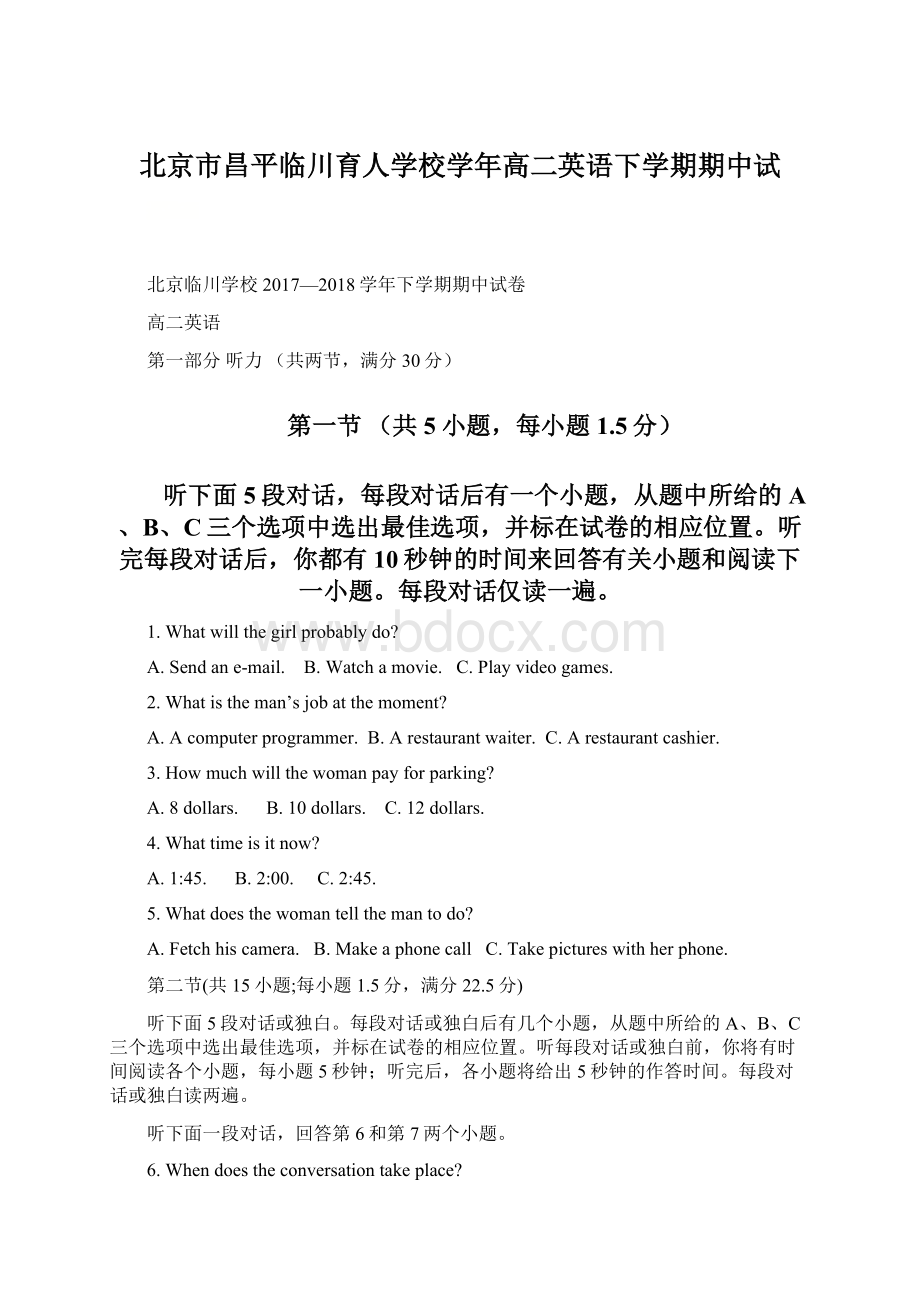北京市昌平临川育人学校学年高二英语下学期期中试文档格式.docx
《北京市昌平临川育人学校学年高二英语下学期期中试文档格式.docx》由会员分享,可在线阅读,更多相关《北京市昌平临川育人学校学年高二英语下学期期中试文档格式.docx(12页珍藏版)》请在冰豆网上搜索。

00.C.2:
45.
5.Whatdoesthewomantellthemantodo?
A.Fetchhiscamera.B.MakeaphonecallC.Takepictureswithherphone.
第二节(共15小题;
每小题1.5分,满分22.5分)
听下面5段对话或独白。
每段对话或独白后有几个小题,从题中所给的A、B、C三个选项中选出最佳选项,并标在试卷的相应位置。
听每段对话或独白前,你将有时间阅读各个小题,每小题5秒钟;
听完后,各小题将给出5秒钟的作答时间。
每段对话或独白读两遍。
听下面一段对话,回答第6和第7两个小题。
6.Whendoestheconversationtakeplace?
A.Atthebeginningofthisterm.B.Inthemiddleofthisterm.C.Attheendofthisterm.
7.Whatdoweknowaboutthewoman?
A.ShehelpedSarawithherstudy.B.Sheworksasamathteacher.C.She’sdisappointedwiththeexam.
听下面一段对话,回答第8和第9两个小题。
8.Whatdoesthewomanwanttodoattheweekend?
A.Haveabirthdayparty.B.GotoseetheBrowns.C.Dosomecleaning.
9.Whatdoesthewomantellthemantodo?
A.Buysomedeliciousfood.B.TalklesswiththeBrowns.C.CalltheBrownsafterwork.
听下面一段对话,回答第10至第12三个小题。
10.HowlonghasMikebeeninLondon?
A.Twoweeks.B.Twomonths.C.Halfayear.
11.WhatistrueaboutMike?
A.Heisinterestedintheweather.
B.HisEnglishhasn’timproved.
C.Hehastalkedalotwithnativespeakers
12.Whatisthewoman’sadvice?
A.WatchingEnglishfilms.B.ReadingEnglishnovels.C.Goingtoparks.
听下面一段对话,回答第13至第16四个小题。
13.HowsoonwillbeFather’sDay?
A.Fivedayslater.B.Sevendayslater.C.Tendayslater.
14.Whatisthewoman’sfathernow?
A.Afarmer.B.Ataxidriver.C.Ateacher.
15.Whichmassagechaircoststhemost?
A.Thewhiteone.B.Theredone.C.Theblackone.
16.Howmuchdoesthewomanspendatlast?
A.$2,000.B.$1,800.C.$1,500.
听下面一段独白,回答第17至第20四个小题。
17.Whattimedidtheplanetakeoff?
A.At5:
00p.m.B.At8:
00p.m.C.At11:
00p.m.
18.WhatdaywasitinLondonwhenthespeakerarrivedinNewYork?
A.Monday.B.Saturday.C.Sunday.
19.WhatsurprisedthespeakerintheFifthAvenue?
A.Thelowprices.B.Theamazingstores.C.Thegoodservice.
20.Whereisthegirlfrom?
A.NewYork.B.LosAngeles.C.London.
第二部分:
阅读理解(共两节,满分40分)
第一节,阅读下列短文,从每题所给的四个选项(A,B,C,D)中,选出最佳选项。
(每小题2分,共30分)
A
ReadingisveryimportanttohelpyoulearnEnglish.Tolearnasmuchasyoucanfromreading,youneedtoreaddifferentkindsofEnglish.This
bookprovidesnotonlydifferentkindsofEnglishbutalsoagoodwaytocheckyourreadingability.
Therearefourpartsinthebook:
Part1isMessages:
Inthispartsomebodywantstowadinformationinwritingtosomebodyelse.Thereisatestontimetablesandatestontextmessages.
Part2isPeople:
Inthispartallthetestsareaboutpeople.Forexample,thereis
aninformalletterbetweenfriends.Thereisformal(正式的)Englishinbiography(传记).Thereisajobapplicationasamodeltohelpwithyourwriting,aswellastestingyourreading.
Part3isPlaces:
Inthispart,toomanydifferentkindsofEnglishareshown,someinformalandsomeformal.ThereistheinformalEnglishofaholidaypostcard.ThereisalsotheformalEnglishinaletterofcomplaint.
Part4isThings:
Youwillfindsomedescriptivewritinginthispart.Therearedescriptionsofclothesandofacomputer.
Youcandothesetestsinanyorderyoulike,oryoucandoallthetestswithaformalorinformaltext.IenjoyedwritingthisbookandIhopeyouenjoyusingit,
21.Wecanfindtheintroductiontoaproductin______,
A.Part1B.Part2C.Part3D.Part4
22.WhichofthefollowingismostprobablywrittenininformalEnglish?
A.Aletterofcomplaint.B.Acomputerhandbook.
C.Alettertoafriend.D.Astoryofapresident.
23.Thepassageismostprobablywrittenfor_____.
A.testdesignersB.studentsC.test-takersD.teachers
24.Whatisthebesttitleofthebook?
A.TestYourReadingB.HelpwithYourWriting
C.Learn
DifferentKindsofEnglishD.PractiseEnglishinDifferentWays
B
Willitmatterifyoudon'
ttakeyourbreakfast?
RecentlyatestwasgivenintheUnitedStates.Thosetestedincludedpeopleofdifferentages,from12to83.Duringtheexperiment,thesepeopleweregivenallkindsofbreakfasts,andsometimestheygotnobreakfastatall.Specialtestsweresetuptoseehowwelltheirbodiesworkedwhentheyhadeatenacertainkindofbreakfast.Theresultsshowthatifapersoneatsaproperbreakfast,heorshewillworkwithbettereffectthanifheorshehasnobreakfast.Thisfactappearstobeespeciallytrueifapersonworkswithhisbrains.Ifastudenteatsfruit,eggs,breadandmilkbeforegoingtoschool,hewilllearnmorequicklyandlistenwithmoreattentiontoclass.
Oppositetowhatmanypeoplebelieve,ifyoudon'
teatbreakfast,youwillnotloseweight.Thisisbecausepeoplebecomesohungryatnoonthattheyeattoomuchforlunch,andendupgainingweightinsteadoflosing.Youwillprobablylosemoreweightifyoureduceyourothermeals.
25.Duringthetest,thosewhoweretestedweregiven________.
A.nobreakfastatallB.veryrichbreakfast
C.littlefoodforbreakfastD.differentbreakfastornone
26.Theresultsofthetestshowthat________.
A.breakfasthasgreateffectonworkandstudies
B.breakfasthaslittletodowithaperson'
swork
C.apersonwillworkbetterifhehasasimplebreakfast
D.thoseworkingwithbrainsshouldhavemuchforbreakfast
27.Thepassagementionsthatmanypeoplebelievethatifyoudon'
teatbreakfast,youwill_________.
A.loseweightB.notloseweight
C.behealthierD.gainalotofweight
28.Whichofthefollowingisnottrueaccordingtothepassage?
A.Poorbreakfastsaffectthosewhoworkwithbrains.
B.Morningdietmaycauseonetogetfatter.
C.Reducinglunchandsupperisoflessvalueinweightlosing.
D.Eatinglessinlunchandsuppermayhelptoloseweight.
C
Ayoungwomancarryingathree-year-oldchildgotonabus.Theconductorhurriedtogiveherawarmwelcomeandthenkindlyaskedtheotherpassengerstomakemoreroomforthewomanandherchild.Onseeingthis,peoplebegantotalk.“Youknowthisconductorusedtobeveryrude.Nowsuddenlyhehaschangedhisbadbehavior,"
saidamiddle-agedman.
“Yes,heshouldbepraisedandwemustwritealettertothecompany,"
saidasecondpassenger.“That'
sright,"
anotherladysaid,“Iwishanewspaperreporterwereheresothatmorepeoplecouldlearnfromthisconductor."
Justthenagentlemanwholookedlikeateacherturnedtotheconductorandsaid,“Excuseme,butcanIknowyourname,please?
Yourexcellentservicemustbepraised..."
Beforehecouldopenhismouth,thethree-year-oldchildsittingontheyoungwoman'
slapinterrupted,“Iknowhisname.IcallhimDad."
29.Thepassengerswere________toseetheconductor'
skindnesstothewomanandthechild.
A.excitedB.pleasedC.interestedD.surprised
30.Onepassengersuggestedwritingalettertothecompanyto______.
A.makeademandformorebuses
B.thankth
econductorforhisgoodservice
C.criticizetheconductorforhisrudebehavior
D.inviteanewspaperreportertowriteabouttheconductor
31.Whatwasthegentleman?
A.Ateacher.B.Anewspaperreporter.
C.Notknownfromthestory.
D.Theconductor'
sfriendfromhiscompany.
32.Theword“he”inthelastparagraphrefersto_______.
A.thegentlemanB.theconductor
C.themiddle-agedmanD.thethree-year-oldchild
D
WhenIwassmallandmygrandmotherdied,Icouldn’tunderstandwhyIhadnotears.Butthatnightwhenmydadtriedtocheermeup,mylaughturnedintocrying.
.Soitcameasnosurprisetolearnthatresearchersbelievecryingandlaughingcomefromthesamepartofthebrain.Justaslaughinghasmanyhealthadvantages,scientistsarediscoveringthatso,too,doescrying.
Whateverittakesforustoreducepressureisimportanttoouremotional(情感的)health,andcryingseemstostudyfoundthat85percentofwomenand73percentofmenreportfeelingbetteraftercrying.
Besides,tearsattracthelpfromotherpeople.Researchersagreethatwhenwecry,peoplearoundusbecomekinderandfriendlyandtheyaremorereadytoprovidesupportandcomfort.Tearsalsoenableustounderstandouremotionsbetter;
sometimeswedon'
tevenknowwe'
reverysaduntilwecry.WelearnaboutouremotionsthroughCrying,andthenwecandealwiththem.
Justascryingcanbehealthy,notcrying—holdingbacktearsofanger,painorsuffering—canbebadforphysical(身体的)health,Studieshaveshownthattoomuchcontrolofemotionscanleadtohighbloodpressure,heartproblemsandsomeotherillnesses.Ifyouhaveahealthproblem,doctorswillcertainlynotaskyoutocry.Butwhenyoufeellikecrying,don'
tfightit.It'
sanatural—andhealthy—emotionalresponse(反应).
33.Whydidn'
ttheauthorcrywhenhergrandmotherdied?
A.Becauseherfatherdidnotwanthertofeeltoosad.
B.Becauseshedidnotlovehergrandmot
her.
C.Becauseshewastooshytocryatthattime.
D.Theauthordoesn’tgivetheexplanation.
34.Accordingtotheauthor,whichofthefollowingstatementsistrue?
A.Cryingisthebestwaytogethelpfromothers.
B.Fightingbacktearsmaycausesomehealthproblems.
C.Wewillneverknowourdeepfeelingsunlesswecry.
D.Wemustcryifwewanttoreducepressure.
35